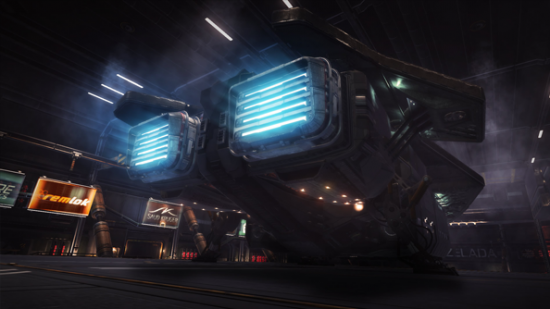Elite: Dangerous Alpha 4 is almost upon us and, with it, the skybox drops away. Currently, Elite takes place in a skydome that’s only one light year across. In Alpha 4 that skydome becomes 100,000 light years across. The release date has been set for 15 May.
“Alpha 4 genuinely contains over 400 billion star systems,” Frontier write in their newsletter. “And they are all moving correctly; spinning, orbiting each other in an incredible astronomical ballet. We are also modelling interstellar molecular clouds, and though some of the detail in these (particularly for nebulae) will come after Alpha 4, wherever you are, the ‘night sky’ is accurate.”
Mother of goodness, this game is impressive.
“Over 130,000 objects in the night sky – including all stars visible to the naked eye – are modelled,” write Frontier. “We can even show those joined-up Solar-centric constellations when viewed from elsewhere – which become stretched and distorted due to parallax. Want to travel to Orion’s belt and see what good old Sol looks like from there? Do it. Or just sit and marvel at the local sunrise (yes all the planets are moving too) over the rings and moons of a gas giant you’ve just found.”
You won’t be able to fly to Earth in Alpha 4 but that’s coming, eventually.
Elite’s engine uses “the precise locations all the known stars, exo-planets, celestial bodies and phenomena,” then, using “procedural techniques” and “real, ‘hard’ physics” it models “the other hundreds of billions of star systems – the star’s location, type, temperature, chemical compositions, what planetary systems there are, etc.”
And the whole the thing is seamless, too. You can be flying about using your standard engines (which still have you travelling at more than 1,000mph) and then spool up to super-luminal speeds to travel quickly through a system, or use hyperspace to travel light years across the galaxy.
All while also modelling every other playing with you in the universe.
Alpha 4 is “centered around the Boötes constellation.” Apparently, it’s just to the left of Ursa Major.
Travelling about this universe will require trade-offs for pilots. Your conventional drives are quick in reality, more than 1,000mph, but in the vastness of space that will get you nowhere fast. Frame Shift Drives (FSD) or ‘super-cruise’ allow you to go much, much faster – “effectively appearing to shrink space around you”.
This allows you to travel across the galaxy on a trading run, or returning from a mining job quickly.
But the FSD is big and heacy. “The additional mass and energy demands of the FSD compromise your ultimate level of agility and performance in a dog-fight against someone who is loaded out without one. […] The situation, both positive and negative, is further exacerbated if you opt for the additional capability and mass of a hyperspace-capable drive.”
“After a significant charge-up period your ship’s hyperspace drive warps space-time and you travel almost instantaneously to the primary star of the destination system, whereupon you are spat out of hyperspace at super-cruise speeds, kicking out an extraordinary amount of heat; this announces your arrival in no uncertain terms to anyone who may be glancing at their scanner.”
You can upgrade your FSD to be more fuel efficient, increase its range, speed, and charge time, too.
There will also be times where you have to drop out of super-cruise rapidly – intercepting a distress beacon, say. “Your ship will suffer dangerous and debilitating effects if you drop out whilst travelling too fast (temporary loss of control, damage, etc.); such an event is called a crash-drop. Flying too close, too fast to a stellar body or phenomena can also cause a crash- drop. In extreme cases (e.g. flying towards a planet at hundreds of times the speed of light) the ship may suffer catastrophic damage when it emergency-drops out of super-cruise.”
As Elite moves into beta (two weeks after the release of Alpha 4), Frontier plan on introducing an “increasing variety of ‘passive’ events, NPC/phenomena and player-to-player interdiction.”
Damn, this game sounds fun.
